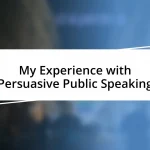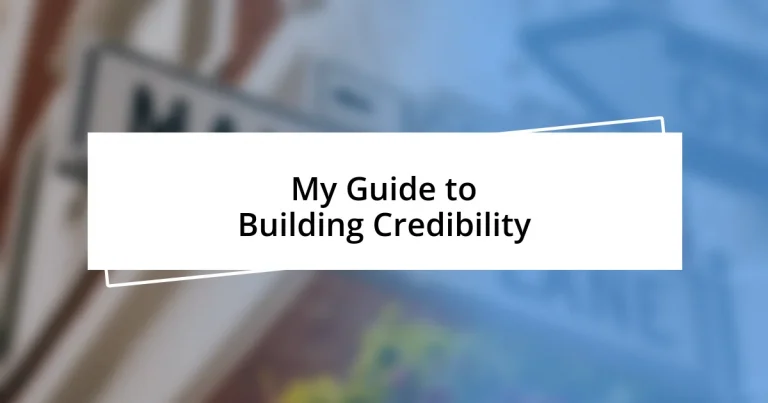Key takeaways:
- Credibility is built on expertise, trustworthiness, and reliability, emphasizing the value of genuine experience over formal qualifications.
- Transparency establishes trust by fostering open communication and accountability, encouraging collaboration and respect among teams and clients.
- Feedback is essential for enhancing credibility, providing insights into audience perceptions and guiding continuous improvement and authenticity in content creation.
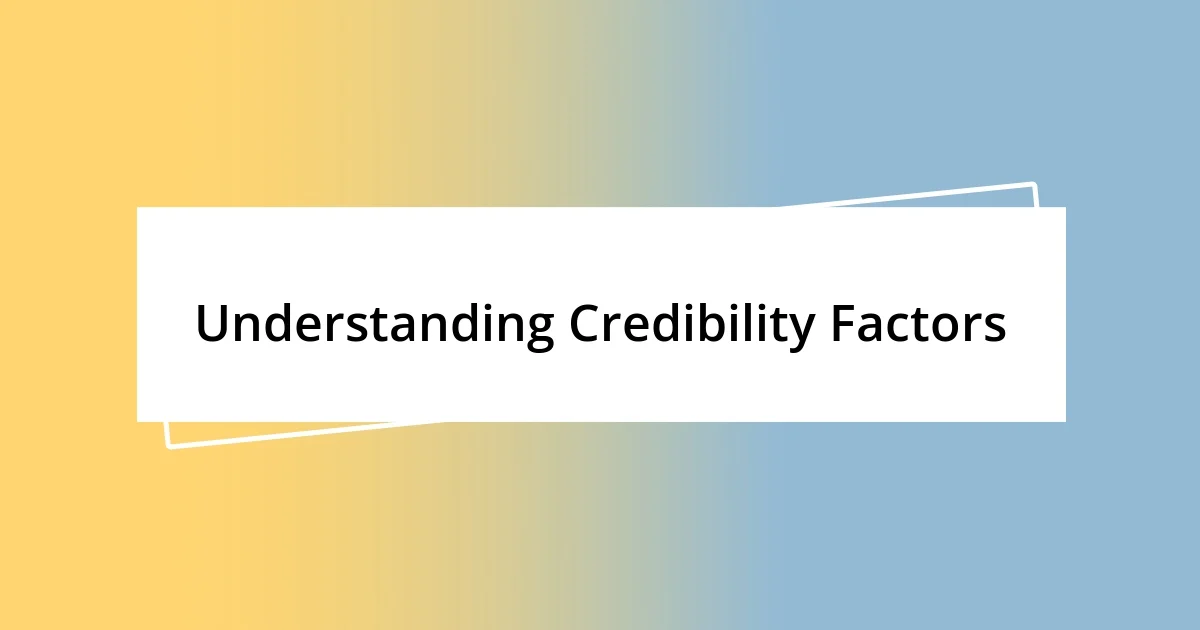
Understanding Credibility Factors
Credibility is built on various factors, and one of the most important is expertise. I recall a time when I hesitated to share my thoughts on a topic I was passionate about because I lacked formal credentials. It made me realize that while qualifications are valuable, genuine experience and knowledge can resonate just as strongly with an audience. Isn’t it interesting how sometimes our lived experiences can speak louder than diplomas on a wall?
Then there’s trustworthiness, which I find to be an essential pillar of credibility. I once followed a blogger whose recommendations seemed spot-on until I discovered they were being compensated for products they reviewed. It shattered my trust, and I wonder if you’ve ever felt that sense of betrayal. Trust, once broken, can be hard to restore, and that highlights the importance of authenticity in every interaction.
Lastly, I’ve learned that reliability plays a crucial role in establishing credibility. For instance, I had a mentor who always responded promptly to my queries, no matter how trivial they seemed. This consistency made me feel valued and secure in their guidance. Have you ever experienced that kind of dependable support? It’s like a safety net that encourages you to reach out and engage, reinforcing the bond of credibility in relationships.
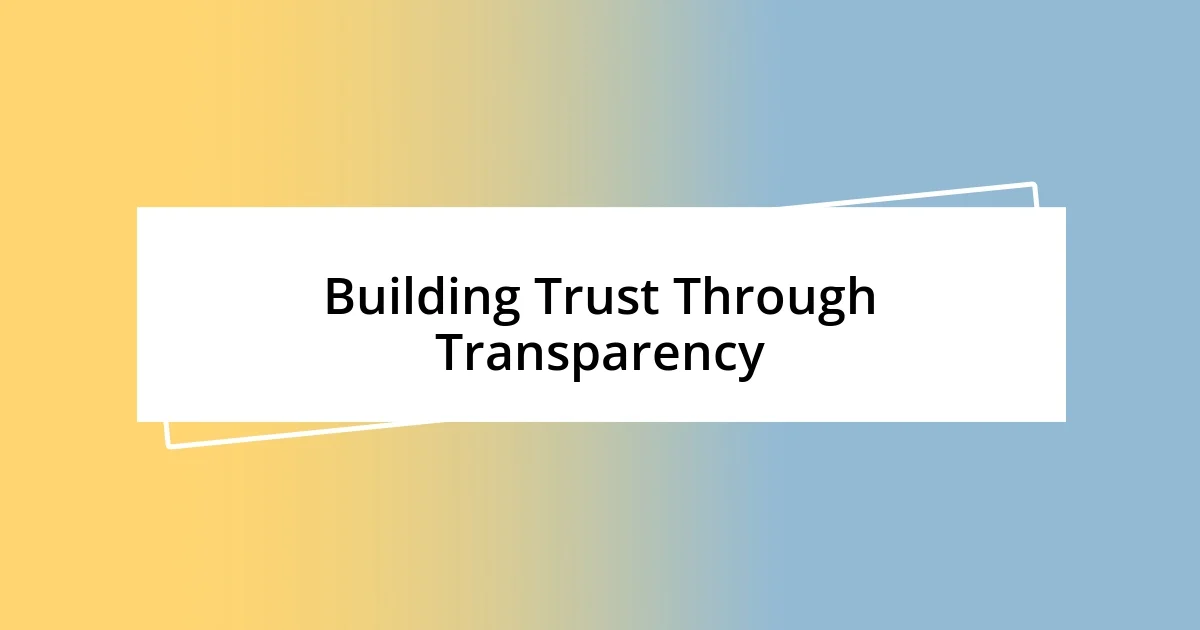
Building Trust Through Transparency
Building trust requires a foundation of transparency. I remember a time when I was on a project team, and the leader openly shared both successes and setbacks. This honesty not only strengthened our bond but also encouraged everyone to contribute ideas without fear of judgment. It’s fascinating how a little openness can transform an environment, don’t you think?
Transparency also means being communicative about processes and decisions. For example, when I worked in customer service, I took the time to explain our policies to clients. In doing so, I noticed that they felt more respected and valued, even if the news I delivered wasn’t what they wanted to hear. This proactive approach solidified their trust, demonstrating that being upfront, even when it’s hard, pays off in the long run.
I find it especially compelling that transparency fosters a culture of accountability. When I led a project, I encouraged my team to share not just their progress, but also any obstacles they faced. By doing so, we all took ownership of our roles and worked collaboratively toward solutions. It’s incredible how teamwork can be strengthened through the simple act of being open and sharing challenges together.
| Transparency | Impact on Trust |
|---|---|
| Openly sharing successes and setbacks | Strengthens bonds and encourages contribution |
| Communicating policies clearly | Makes clients feel respected and valued |
| Encouraging sharing of challenges | Fosters accountability and teamwork |
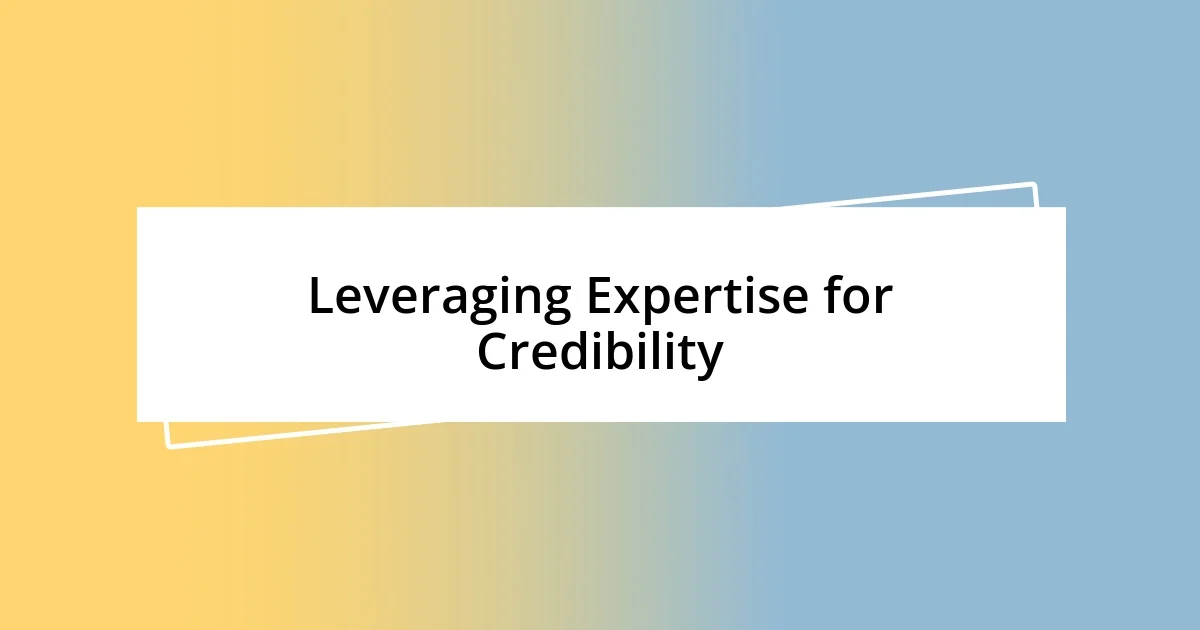
Leveraging Expertise for Credibility
When it comes to leveraging expertise for credibility, I often reflect on my own journey in a particular field. I once worked on a project where my colleagues were highly credentialed, but I realized that my hands-on experience brought a unique perspective. This taught me that sharing specific insights from my work not only built my credibility but also made the team value my contributions. It’s enlightening how real-world knowledge can enhance perceived expertise, isn’t it?
To effectively leverage expertise, consider these strategies:
- Share personal experiences: Relate a story that illustrates your knowledge in action.
- Offer unique insights: Present findings or perspectives that others might overlook, showcasing your depth of understanding.
- Engage through mentorship: By helping others grow, you reinforce your own credibility while establishing trust and connection.
I’ve found that these approaches not only build credibility but also resonate with others, creating a shared space for learning and growth. It’s an enriching cycle that strengthens connections and enhances the value we bring to our communities.

Creating Valuable Content Consistently
Creating valuable content consistently isn’t just a checkbox; it’s a vital part of establishing credibility. I’ve discovered that when I committed to regular blogging about my industry, I not only honed my writing skills but also built a loyal audience. Each post became an opportunity to share insights, creating a relationship with readers who came to rely on my perspective. Don’t you think having a steady stream of useful content can solidify a writer’s reputation?
The key is to ensure that your content resonates with your audience. I remember a time when I tailored my content to address specific questions I’d received from clients. Their engagement surged as I provided solutions to the very issues they faced. This responsiveness demonstrated that I listened and cared, which deepened their trust in me. Have you ever noticed how addressing your audience’s needs makes them feel more connected to you?
Consistency doesn’t mean sacrificing quality for frequency, though. I often set aside time each week to brainstorm and curate ideas, ensuring I deliver informative and engaging articles. This practice not only makes content creation easier but also allows me to stay ahead of trends in my field. It’s amazing how a disciplined approach can keep your message relevant and impactful, isn’t it?

Engaging with Your Audience Effectively
Engaging with your audience effectively starts with listening. I learned this firsthand during a live webinar I hosted. While I prepared a detailed presentation, I found that the real gold came from the questions asked by attendees. Their curiosity guided our discussion, and I realized that answering their queries not only captivated their attention but also made them feel valued. How often do we miss opportunities simply because we don’t pause to listen?
Another powerful tactic is to share your own challenges. I remember sharing a story about a significant setback I faced early in my career. The vulnerability in talking about my struggle resonated deeply with my audience, leading to a flood of responses and shared experiences. It was a reminder that authenticity can turn a casual interaction into a meaningful connection. Don’t you find that when people see your human side, it’s easier for them to relate?
Lastly, asking for feedback is crucial. I once ran a quick poll after an article release, seeking opinions on what topics my readers were most interested in. The response was tremendous, and it not only shaped my future content but also made my audience feel they played a part in the conversation. Isn’t it fascinating how inviting participation empowers both you and your audience? By creating this dialogue, you not only maintain engagement but also foster a community that thrives on shared knowledge and collaboration.
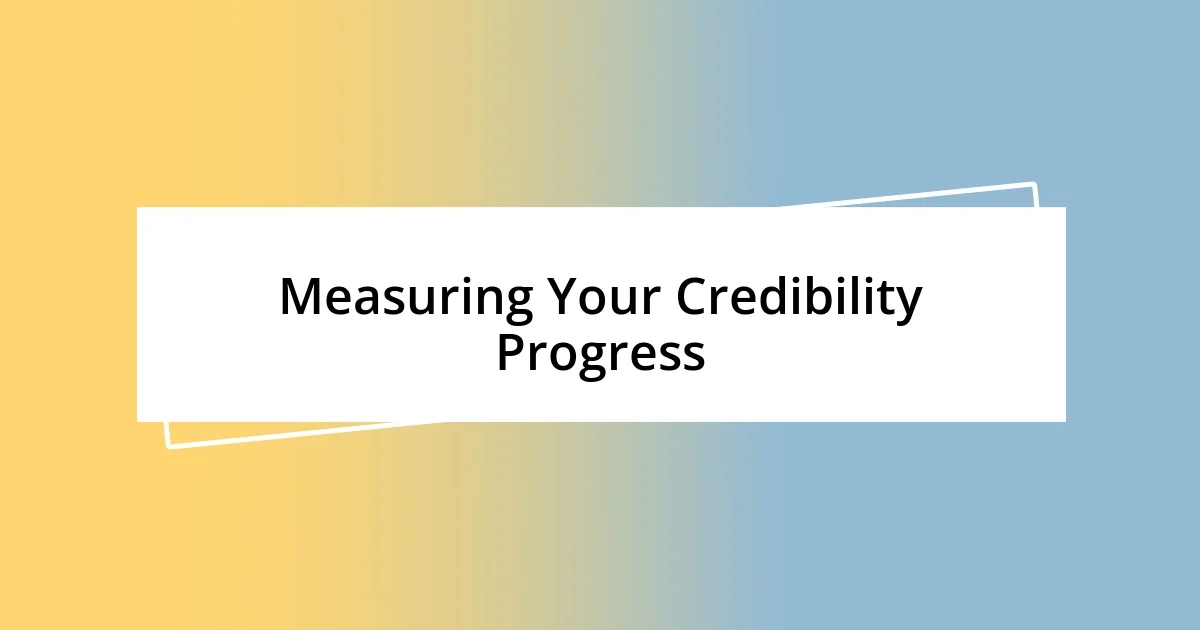
Measuring Your Credibility Progress
Measuring your credibility progress can often feel like a daunting task, but it’s more straightforward than it seems. I remember when I first started tracking my online engagement metrics; I was amazed at how something as simple as monitoring comments and shares could highlight my credibility growth. Each new comment felt like a badge of honor, confirming that I was reaching my audience effectively. Have you ever noticed how those small interactions can feel like stepping stones in building your credibility?
A particularly revealing moment came when I asked my followers to rate their trust in my content on a scale from one to ten. The responses were eye-opening; some rated me a nine, while others hesitated to give a higher number. This helped me identify areas where I needed improvement. Isn’t it interesting how a little feedback can illuminate the path to greater credibility?
It’s also essential to reflect regularly on these metrics. I set aside time each month to review my engagements, which has led to some surprising insights. For example, I realized that posts discussing my personal experiences received much more interaction than more technical content. This not only guided my future writing but also reminded me of the importance of relatability in building trust. How often do you take a step back to analyze what truly resonates with your audience?
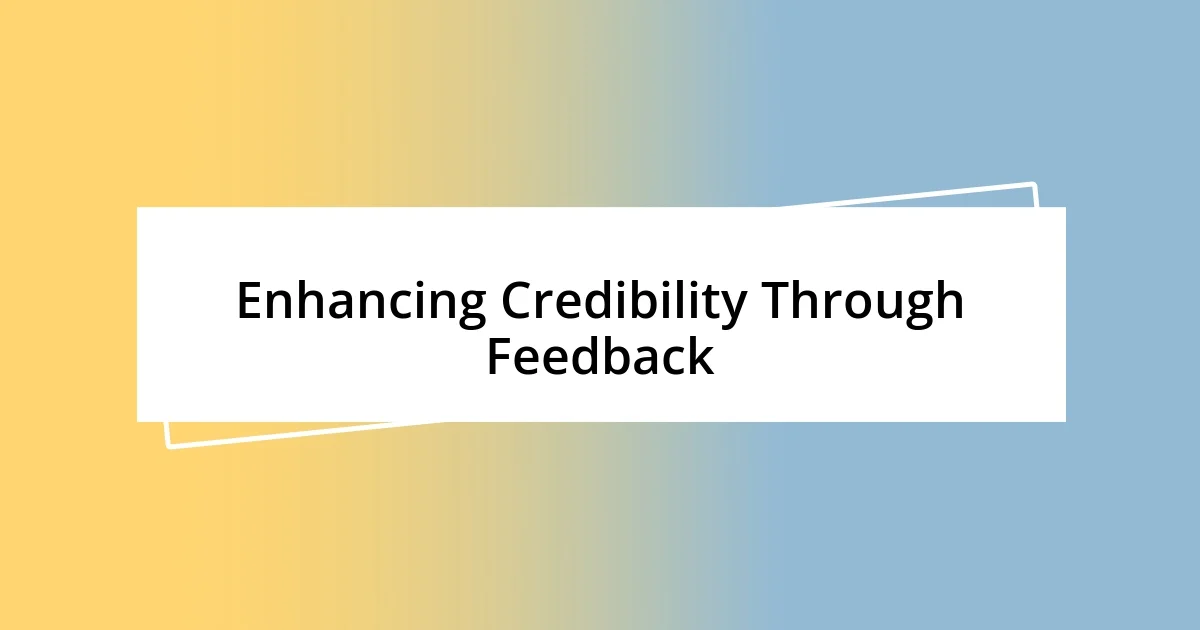
Enhancing Credibility Through Feedback
Feedback is vital in honing one’s credibility because it offers real insights into how others perceive us. I recall a time I presented at a conference and invited attendees to comment on my presentation style. The feedback I received was remarkably varied—some loved my enthusiasm, while others suggested I could tone it down. This divergence not only surprised me but also made me realize that perceptions of credibility can be quite subjective. Have you ever experienced a clash between how you see yourself and how others perceive you?
Emotional responses to feedback can shape how we evolve in our credibility journey. After receiving constructive criticism on a blog post, I felt disheartened initially. However, I chose to reflect on the comments and recognized they came from a place of care. This lesson reinforced my understanding that vulnerability in accepting feedback can actually enhance my credibility. Isn’t it curious how sometimes, a bit of constructive feedback can push us toward deeper authenticity?
I strive to incorporate feedback into my growth plans actively. Once, I held a focus group composed of my loyal readers, asking them what elements made me trustworthy in their eyes. The insights were enlightening—they valued my transparency and consistency above all else. It’s amazing how tailoring your approach based on feedback not only boosts your credibility but also fosters stronger bonds with your audience. How are you currently using feedback to refine your credibility?










